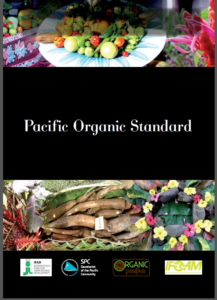 The Pacific Organic Standard is the third regional organic standard produced worldwide, after the EU regulation 2092/91 and the East African Organic Products Standard. The provisions of the Standard take into account both local agricultural traditions and the two global organic standards, IFOAM IBS and Codex Alimentarius. Thus, Pacific stakeholders have true ownership of their regional standard, while at the same time, it is consistent with existing international standards. This consistency will facilitate future negotiations.
The Pacific Organic Standard is the third regional organic standard produced worldwide, after the EU regulation 2092/91 and the East African Organic Products Standard. The provisions of the Standard take into account both local agricultural traditions and the two global organic standards, IFOAM IBS and Codex Alimentarius. Thus, Pacific stakeholders have true ownership of their regional standard, while at the same time, it is consistent with existing international standards. This consistency will facilitate future negotiations.
This consistency will facilitate future negotiations in the context of export market development.
The Pacific Organic Standard covers organic production and processing and is appropriate for the unique social, cultural, environmental and agricultural conditions of Pacific Island countries and territories. The Standard does not cover conformity assessment procedures, and hence leaves the door open for local stakeholders to develop their own, locally appropriate organic guarantee systems for serving local, national and regional markets.
The development of this Standard has included an intensive regional consultation process. Feedback from these consultations, and technical comparisons with international organic standards, informed the work of the Regional Organic Task Force – a highly successful public-private sector partnership comprising representatives of national organic movements, government bodies, organic businesses and regional NGOs.
The Pacific Organic Standard is expected to serve as a basis for raising the profile of organic agriculture among farmers and consumers, strengthening organic production capacity in the region, and promoting further development of local, regional and international markets for Pacific organic agriculture products.
Pacific Organic Standard document
Readers Guide to the Pacific Organic Standard
The Pacific Organic Standard (POS) Handbook is a comprehensive guide designed to clarify the criteria of the Pacific Organic Standard for users. The handbook was developed in 2021 through 13 regional workshops involving stakeholders from across the Pacific region. The handbook’s content clarifies the POS criteria that were identified as unclear or controversial, offering interpretations of the criteria and best practices for implementing them in the field.
The POS Handbook is designed for three types of users: individuals or companies seeking to understand the POS and become inspired by its standards, those who wish to obtain or renew their certification and improve compliance, and individuals responsible for assessing compliance with the standard. The handbook follows the structure and color codes of the POS, with symbols used to identify different types of information, such as interpretations of the POS, references to guidelines issued by POETCom, best practices, extracts of the POS, conformity assessments, and future POS amendment notes. The handbook also includes numerous case studies and examples of good practices relevant to the Pacific context. The handbook is a living document and is revised regularly based on feedback from users. The goal is to ensure the handbook remains a useful tool for stakeholders in the Pacific organic agriculture sector.
You can access the document here:
Click to Download the Readers Guide to the Pacific Organic Standard